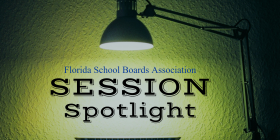Several Interim Legislative Committee meetings were held last week. Among the more significant meetings, the Senate PreK-12 Education Appropriations Subcommittee conducted a workshop on teacher pay and compensation. DOE presented an overview of statutory requirements and various adjustments, supplements, benefits, and other funding relating to compensation. This was followed by comments from a panel of district superintendents — Robert Avossa (Palm Beach); Tim Forson (St. Johns), Jacob Oliva (Flagler), Rick Shirley (Sumter), and Malcolm Thomas (Escambia) – who discussed local and statewide issues of concern regarding compensation, recruitment, and retention of instructional and related personnel. The Meeting Packet – which includes the DOE PowerPoint presentation and spread sheets detailing statewide and district-by-district funding and expenditures for teacher pay and compensation – is available HERE.
The House PreK-12 Appropriations Subcommittee continued gathering information for the budget reduction exercise that the House has chosen to pursue. Commissioner Stewart presented DOE’s General Revenue Reduction Plan which has a required 10% reduction target. In developing its General Revenue Reduction Plan, DOE focused on making the most significant reductions in programs and services that do not have a statewide impact. As a result, funding for some programs was completely eliminated while funding for others were reduced by 9.26%. While the resulting General Revenue Reduction Plan can seem alarming, please note that this Plan is required each year as part of the normal budget development process. It is separate from this year’s House budget reduction exercise but can provide insight to the Subcommittee as it works to identify funding priorities. As we reported earlier, the Subcommittee is scheduled to conduct the budget reduction exercise at their meeting scheduled for February 9th and is expected to report their recommendations to the full Appropriations Committee the following week. In other business, the Subcommittee conducted a review and Discussion of Early Learning Services. The Meeting Packet – which includes the DOE General Revenue Reduction Plan – is available HERE.
[toggle title=”Other Meetings of Interest This Week“]
The House PreK-12 Innovation Subcommittee focused public school choice options. Marc Mora (Lee County School District) and Carolyn Bridges (Polk County School District) offered presentations and discussion highlighting the numerous choice programs offered in their districts. Ruth Lynch (Florida Consortium of Public Charter Schools) and Ralph Arza (Florida Alliance of Charter Schools) also offered presentations on various charter school programs. The Meeting Packet is available HERE.
The House PreK-12 Quality Subcommittee focused on the improving low-performing schools. Chancellor Hershel Lyons presented an overview of the turnaround process and options which was followed by a panel discussion on state and local implementation of turnaround options. The panel members included Commissioner Pam Stewart, Wayne Green, (DOE), and Dr. David K. Moore (Miami-Dade County Public Schools). The Meeting Packet is available HERE.
The Senate Education Committee considered and passed two bills relating to higher education. SB 2 (identical to HB 3) focuses on strengthening funding and programmatic mechanisms in Florida’s post-secondary institutions and SB 4 (identical to HB 5) focuses on faculty recruitment, retention, and recognition. These bills are a high priority for Senate President Negron. The Meeting Packet is available HERE.
The House Local, Federal, and Veterans Affairs Subcommittee considered, among other things, HB 139 relating to local tax referenda (identical to SB 278). This bill requires that any referendum to levy a discretionary sales surtax must be held during a general election and approved by a majority of electors voting on the ballot question. The committee passed the bill which will now move on to two more committees of reference for consideration.
The Senate Criminal Justice Committee considered two bills relating to juvenile justice. Of particular interest is SB 196 (similar to HB 205 and HB 213) relating to civil citations and similar diversion programs. The bill requires a law enforcement officer to issue a civil citation or require the juvenile’s participation in a similar diversion program when the juvenile admits to committing specified offenses and authorizes the officer to issue a civil citation or require a similar diversion program in some other situations. The Meeting Packet is available HERE.
[/toggle]
The next round of Interim Legislative Committee meetings will be held during the week of February 6-10. In the meantime, please note that we have updated our FSBA Bill Tracking List to include education-related bills that have been filed through January 29, 2017 (the Bill Tracking List is also posted on the FSBA website on our 2017 Legislative Session page). Please be sure to also visit our Advocacy Tools page in our Resource Room where you will find information to support your general advocacy efforts and background materials on the legislative process, state budget development process, email and website links, and media tips.







